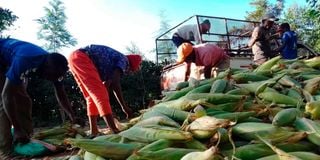Premium
Farmers jittery over plans to import maize from Tanzania, Uganda

Farmers load harvested maize onto a pick-up van in Kirinyaga County for transportation to the market in July 2023.
The government is faced with a difficult balancing act of increasing agricultural production and achieving food security by reducing fertiliser prices, while at the same time maintaining attractive producer prices for farmers by protecting them from losses due to low market prices caused by the influx of cheap imported produce.
While the reduction in fertiliser prices from Sh3,500 to Sh2,500 per 50kg bag will reduce production costs, farmers have expressed fears that the entry of cheap maize under the East African Community (EAC) Common Market Protocol ahead of this season's harvest will destabilise prices and expose them to losses.
Farmers are opposed to allowing market forces of supply and demand to determine maize prices, arguing that the arrival of cheap produce will disadvantage them as they struggle to break even.
"The cost of production in the other EAC member states — Tanzania and Uganda — is lower and they harvest their produce before us, allowing them to enjoy favourable market prices," said Mr Jackson Kosgei in Moiben, Uasin Gishu County.
Also Read: NCPB on the spot over food reserves
Most farmers in the North Rift region have in the past taken to the streets to protest at low producer prices due to the influx of cheap grain from EAC countries.
The demonstrations took place during the administrations of former presidents Mwai Kibaki and Uhuru Kenyatta.
"Prices need to remain above Sh6,000 per bag for us to break even and consider maize farming as a viable investment," said Ms Hellen Kemboi in Cheptiret, Uasin Gishu County.
Maize farmers were enjoying attractive prices of over Sh6,200 per 90kg bag due to the acute shortage on the world market.
But they are facing imminent losses as they prepare to harvest the crop in the next three months, with prices for a 90kg bag dropping from Sh6,400 to Sh5,600.
"Maize prices are likely to fall further due to the arrival of cheap maize from Tanzania and Uganda. This is because small-scale farmers are investing in growing short term crops after the government cut fertiliser prices," said Mr Kipkorir Menjo, a director at the Kenya Farmers Association.
Also Read: Millers divided over cost of ‘cheap’ unga
According to the United Grain Millers Association (UGMA), maize imports from Tanzania are landing at Sh5,700 and from Uganda at Sh5,400 per 90kg bag, which is lower than local produce that sells at Sh6,000.
Tanzania is a major exporter of maize and rice to Kenya and other countries, including Democratic Republic of Congo, Burundi and South Sudan.
Agriculture Principal Secretary Kello Harsama expects this season’s maize harvest to be between 35 and 40 million bags.
According to the Kenya National Bureau of Statistics, Kenya has imported an average of 295,092 tonnes of maize annually over the past five years.
The country's annual maize requirement is 52 million bags for human consumption, animal feed production, seed multiplication and the manufacture of other products.
But agricultural experts argue that high production costs are hurting farmers, making it difficult for them to break even.
It costs a farmer Sh4,500 to plough an acre of land, with the production of a 90kg bag of maize estimated at Sh1,700, the highest in the East African region.
According to Trans Nzoia County Agriculture Executive Phanice Khatundi, the devolved unit expects to harvest 5.6 million bags of maize, while local consumption is about two million bags, with the rest being released to the market.
Uasin Gishu County is expected to harvest about 4.5 million bags of maize, of which more than 2.5 million bags will be released to the market.





